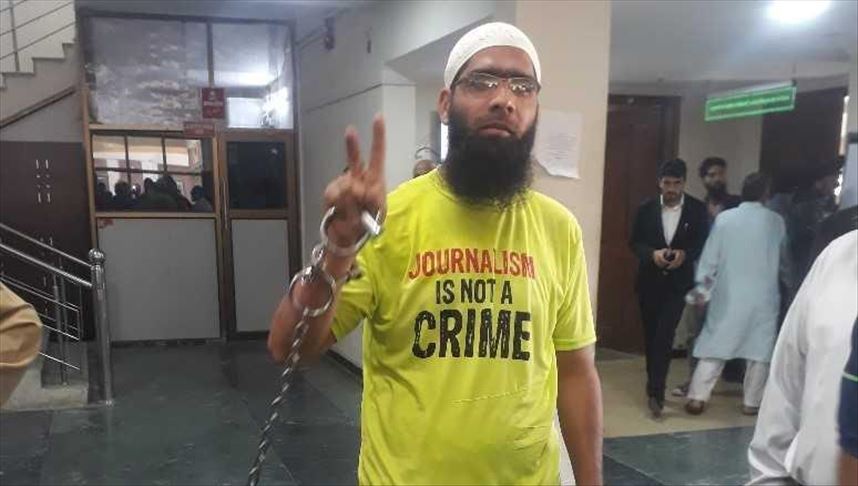Kashmiri journalists seek release of imprisoned fellow
As world marks Press Freedom Day, journalists in Srinagar call on authorities to release their fellow Asif Sultan
 Journalist Asif Sultan
Journalist Asif Sultan
SRINAGAR, Jammu and Kashmir
As the world marked the Press Freedom Day on Friday, journalists in Jammu and Kashmir gathered in the capital Srinagar, seeking release of their imprisoned fellow Asif Sultan.
Speaking on what they called increasing censorship by Indian authorities, the Kashmir Journalist’s Association said that Sultan’s incarceration reflected the growing threat that journalists are facing in the region.
“We have to walk a very thin line. One feels threatened from all sides as a journalist, and Asif Sultan’s incarceration is an everyday reminder to us of how dangerous this place is for journalists,” Moazum Mohammad, president of the association, told Anadolu Agency.
Sultan, an assistant editor of a local English language magazine Kashmir Narrator, was shown arrested by police on Aug. 31, 2018, but his family and editor say he had been kept in illegal detention for five days before the police showed his arrest.
“He is in prison because of journalism. There is no other reason for his imprisonment,” Showkat Motta, editor of Kashmir Narrator, told Anadolu Agency.
“I know him since he started as a journalist in 2010, and I can vouch for his integrity,” he added.
Motta said he anticipated a reaction from the authorities after his publication carried a long profile of slain militant leader Burhan Wani in July 2018, two years after Wani was killed.
“Immediately after the profile was published, I received emails from an unknown account portraying itself as an account of the police’s intelligence department. The email questioned the intent of the story, make an accusation that we were glorifying militancy in the region and sought replies from us. I knew what it was: intimidation by the authorities, without owning it up,” the editor of the magazine recalled.
- ‘Nothing but journalism’
“I thought they were going to arrest me. Though, the story was written by Asif (Sultan), I was his editor and he would never have done it without taking me on board. But, the police arrested Asif during a night raid at his home,” Motta says.
The profile, Motta says, was a well-researched piece that took Asif (Sultan) three months to report on.
“If you read that story you will realize that it is nothing but journalism,” he added.
Earlier this year, police submitted the charge sheet against Sultan in the court. The charge sheet names ten persons, including Asif Sultan, and accused them of sheltering militants who killed a police constable in a shootout at Batamaloo area of Srinagar.
“Police, while constantly maintaining that they had evidence of Asif’s complicity, have not produced any real evidence yet,” Motta said.
Motta has been following Sultan’s case with the police and the court, saying Sultan’s incarceration is about journalism and it is his responsibility as editor to fight for him.
At one hearing in the court, Asif appeared in a T-shirt that said “Journalism is not a crime”, a picture that became viral on social media in the region.
While international human rights groups -- including Amnesty International -- and journalist bodies like Committee to Protect Journalists, Reporters Without Borders and International Federation of Journalists have condemned Sultan’s arrest, Motta said even securing his bail is an uphill task, as all they get at court hearings is a new date.
- ‘Dangerous edge’
The Kashmir Editors Guild (KEG), a body of newspapers’ editors in Kashmir, has also been vocal in its condemnation of the arrest and also in the manner in which the case has been handled by the authorities.
“There has been no transparency in the procedure. There hasn’t even been a proper response from the government to all the questions raised by independent journalist and human right bodies,” Bashir Manzar, editor of Kashmir Images newspaper and general secretary of the Guild, told Anadolu Agency.
Manzar also said that journalists in the region were living on the “dangerous edge” and often paid for their work with their lives.
“While Asif is in prison and newspapers have been banned, their advertisements have been stopped to bring them to their knees, many of our colleagues have been killed. What could be worse than that?” Manzar said.
At least 18 journalists and media people have been reportedly killed in Kashmir while hundreds have been wounded over the past 30 years of conflict.
Jammu and Kashmir, a Muslim-majority Himalayan region, is held by India and Pakistan in parts and claimed by both in full. A small sliver of Kashmir is also held by China.
Since they were partitioned in 1947, the two countries have fought three wars -- in 1948, 1965 and 1971 -- two of them over Kashmir.
Also, in Siachen glacier in northern Kashmir, Indian and Pakistani troops have fought intermittently since 1984. A cease-fire came into effect in 2003.
Some Kashmiri groups in Jammu and Kashmir have been fighting against Indian rule for independence, or for unification with neighboring Pakistan.
According to several human rights organizations, thousands of people have reportedly been killed in the conflict in the region since 1989.
Anadolu Agency website contains only a portion of the news stories offered to subscribers in the AA News Broadcasting System (HAS), and in summarized form. Please contact us for subscription options.


